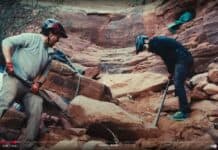
With the design phase now complete, the city of Sedona has a good idea of when the Forest Road Extension project will begin and end.
During the Sedona City Council meeting Tuesday, Sept. 28, staff gave an update on the project’s status.
Council, by a unanimous vote, approved a resolution establishing the need and public purpose for right-of-way and easements necessary for the project for $1.6 million.
The new portion of Forest Road will connect with State Route 89A west of the U.S. Post Office. The street will include a shared-use bike and walk pathway.
A 2018 survey of Uptown residents found 78% supported building the extension. It will allow Uptown residents to bypass the two roundabouts at Brewer Road and the “Y” and serve as an additional ingress and egress route for emergency responders and emergency evacuation.
Sedona City Engineer Andy Dickey said the plan is to go out to bid for a contractor and once approved, work could begin as early as this December with a completion date of January 2023.
The resolution approved by council would authorize, in advance, formal condemnation proceedings if the necessary property and easements cannot be obtained by informal negotiations.
In all, 11 parcels owned by nine separate entities and individuals are directly affected by the project. Based on construction designs and in part on discussions with the owners, the city is looking to acquire a variety of property rights including fee title to the right-of-way and easements for right-of-way, slope, drainage, sanitary sewer and temporary construction.
“There are 11 properties we need to acquire rights from,” Dickey said. “These are essential for what we need to complete our project. We have communicated with all the properties and attempted negotiations. Currently, it appears with six of these 11 properties we’re having productive negotiations.”
The report also states the city commissioned a pair of appraisals for the properties. Following the first appraisal in March, the city sent offer letters to the owners based on the market valuations in April 2021. After negotiations with the property owners, city staff decided to seek an additional appraisal in May. The results of the second appraisal were provided to the city in August.
Second offers to purchase the property and easements were sent to property owners in early September.
“The design has identified all areas that will require purchase of right-of-way property or easements,” the report states. “The city has made two offers to each owner of the affected properties to purchase the needed right-of-way or easements. If a mutually agreeable amount of compensation cannot be arrived at prior to the time construction is to begin, it will be necessary to begin condemnation proceedings.”
It goes on to state, typically, the type of project with its needed right-of-way and easements are not contested based on location or necessity. Disputes generally relate to the adequacy of the compensation. In such cases, staff attempts to negotiate a mutually satisfactory compensation. Condemnation is only pursued if this attempt fails or the owner requests the city pursue condemnation to establish the value of the easement.
Arizona Revised Statutes states taking private property must be for a public use and that the taking be necessary for that public use.
Arizona case law has interpreted public use to include: Use of the land by the public, promoting the public welfare and promoting the purposes of a governmental entity. The Forest Road Extension Project will be a public street with a shared use path. In all cases, through condemnation, fair compensation must be made. None of these steps would require additional council action.




















